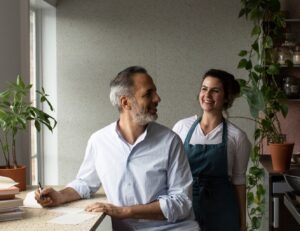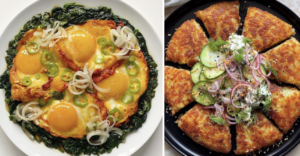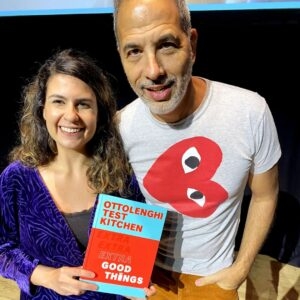Interview
Yotam Ottolenghi and Noor Murad: ‘Why we should all stop worrying about authenticity’
02 Dec 2022
6m
The word Ottolenghi is now as synonymous with fusion food as it is with the man himself.
Whether it’s za’atar cacio e pepe, silken tofu with caponata or curried cauliflower cheese, a dish from Yotam Ottolenghi and his team is instantly identifiable because it ventures where many people don’t think (or dare) to go. It combines flavours from the Middle East, the Mediterranean, North Africa and Asia, honouring them and simultaneously flipping them on their heads in one fell swoop.
“We love the idea that there is some kind of authentic way to cook, but if you look deep into the way people have done it historically, there really isn’t one way,” says the Israeli-born chef, in an exclusive interview with Twisted.
“Normally it has to do with a family or a tribe, or group of people that prepare a meal in a particular way, but as soon as you move away, you will find variations on those particular themes.
“[The word authentic can be] quite stifling, and also means that you’re kind of aiming for something that is beyond the food and flavour.”

Yotam Ottolenghi and Noor Murad (Credit: Elena Heatherwick)
Anybody who ever cooked or eaten an Ottolenghi recipe will have soaked up his healthy scepticism towards the idea of cooking ‘inside the box’. His ethos is to let flavour (incidentally the name of one of his bestselling cookbooks) do the talking.
His 2012 cookbook, Jerusalem – co-written with Palestinian-born Sami Tamimi – explored the city against the backdrop of the war in the Middle East, honouring the melting pot of Muslim, Jewish, Christian, Arab and Armenian flavours that make up the area, and the way cooking methods and flavours could transcend borders.
Now, he has an empire of seven highly-acclaimed restaurants and nine best-selling cookbooks, each of which embrace the same attitude, presenting food with an amalgamation of cultural references and encouraging people to bring the same to their dinner tables.
But despite his indisputable reputation as the King of fusion, Yotam may just have out-Ottolenghi-ed himself.
His new cookbook, Ottolenghi Test Kitchen: Extra Good Things, invites readers to take fusion cookery even further, giving them the chance to boldly mix some of the most beloved condiments, sauces and marinades from the staff at his Holloway development kitchen with whatever dishes they choose.
That’s right, with as many as 75 ‘extra good’ recipes to mix and match in thousands of different combinations, Ottolenghi and his team now want you to go beyond their recommended dishes and use your imagination.
They want you to throw fiery hot sauce into chicken soup, everything seasoning on a potato rosti and pickled onions onto pretty much anything you want.
Here at Twisted, you know we strongly support this message…
“[In the new book], we really want to encourage people to take the flavours they love, or even just an aspect of a dish they really like, and then run with it,” says Noor Murad, the test kitchen’s lead chef, who co-authored the new cookbook, as well as 2021 hit, Shelf Love.
“During the pandemic, there were two things we were doing at the test kitchen. Just like everyone else, we were rummaging through our cupboards and that was the inspiration for Shelf Love – being frugal and being resourceful.
“But at the same time we found that as we were cooking in a different way. We always ended up with little jars leftover, like a quick chilli sauce or a pesto or a dukkha, which we then used to accessorise whatever meal we wanted, from stuff on toast to a fried egg.
“That inspired Extra Good Things…I think a lot of people are drawn to Ottolenghi food because it’s often something familiar, but then it always has a little twist, and that comes, a lot of the time, from these extra little sauces and condiments and pickles.
“You start from the ground up and then you build and layer flavour. In many ways, that’s [the definition of] Ottolenghi-fying something.”
Of course, Yotam and Noor both understand why some people might be nervous at the idea of mixing ingredients society wouldn’t normally put together – after all, there’s no denying fusion cookery is and always will be a sensitive topic to navigate.
Done wrong, it can at best raise eyebrows and at worst appropriate and erase the individuals and cultures behind some of our favourite dishes.

Turmeric eggs and everything bagel rosti, both from Extra Good Things (Credit: Instagram: Ottolengi/ Noor Murad)
But Yotam reasons: “In life, one culture is always in conversation with another culture, whether it’s through positive exchange, whether it’s through wars and occupations, and this is just the nature of human history.
“I think that good fusion has been going on as long as humanity has been around. I don’t think we should deny it; I think we should embrace changes and all of these wonderful combinations.”
As for the bad fusion? “That comes when a dish seems gratuitous or doesn’t make sense in someone’s head…when you just mess with it for the sake of it and it’s not as good as the original… like beetroot humous,” he smiles. “I don’t think humous needs that particular fusion added to it”.
More importantly, of course, Yotam warns that fusion fails “when you fuse cultures together and you’re not sensitive enough as to what happens when you do this.
“It’s when you don’t ask, ‘What is this dish? What is the journey that it has taken to reach us?,” he says.

Yotam and Noor with their new book (Credit: Instagram/ Ottolenghi)
Nodding in agreement, Noor recalls: “In the book we have a recipe for a Kosheri – it’s an Egyptian rice, lentil and pasta dish – but we use we use giant couscous instead, which is a great textural change that we really enjoy.
“But at the same time, [when writing] we knew we needed to include that story, and make clear it was a take on an original dish. I think that’s a really important part when you make those changes.
“[In the test kitchen] we do a lot of research into each dish itself. It’s just about being genuine. It’s about respecting the food and cooking as best you can.”
Of course, this is made easier by Ottolenghi’s roster of incredible technically trained chefs with killer knowledge and instincts. But furthermore, they also have the benefit of learning from each other’s diverse backgrounds, too.
Noor is from Bahrain, Yotam is from Israel, and their colleagues are from all over the world, including the likes of Mauritius and Germany.
“When people work side-by-side from different cultures, the types of things that happen are really, really interesting,” Yotam says. “I’ve worked with so many people that I can’t even remember all their names but can remember their flavours, and that is a very special thing.”
“Ottolenghi is a huge world of lots of different creators that have come and gone over the years, and each of the chefs leaves their fingerprints and identities on the dishes that we [make],” adds Noor.
“You’re always going to be open to different ways of doing things…different combinations and cooking techniques. That’s the only way that you grow, and I just feel like we never stop learning.
“To say ‘these are the rules, and you can’t go outside them’ would be a very limiting way of thinking about things.”
“I’d say as long as you’re aware of what you’ve cooked, and you tell that story, then if you want to combine your favourite Japanese condiment with an Italian pasta dish it’s all cool,” Yotam concludes.
“I think it’s really important not to constantly question your instincts. If you like something, that’s great. I don’t think you need to justify it.
“Be authentic to yourself. That’s what you need to do”.
Feeling inspired? Ottolenghi Test Kitchen: Extra Good Things is available to purchase here. (Ebury Press, £25) All photography by Elena Heatherwick

.jpg_RVG9qi?tr=w-2560,f-webp,q-70)
.png_2XIXGj?tr=w-2560,f-webp,q-70)
.jpg_qa3BF9?tr=w-2560,f-webp,q-70)